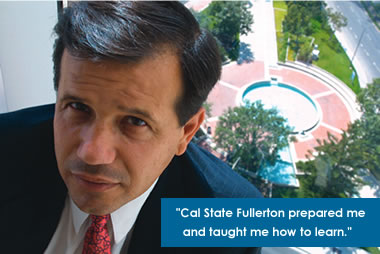Man In Motion
He's sitting down, but that doesn't take away from the fact that Miguel Pulido is moving at a fast trot. Saddled comfortably into a swivel chair next to his office coffee table, the mayor of Santa Ana is taking calls on an earpiece-fitted cell phone clipped to his belt. He's advising, planning, dealing, pressing briskly ahead. He will be interrupted several times during the course of an hour–by more calls, documents that need his attention, a television crew from a Spanish-speaking station. He handles them all with the aplomb of a veteran multitasker. Pulido appears to be 95 percent a modern, shirtsleeve city mayor: crisp monogrammed white shirt, neatly knotted silk tie, charcoal gray suit, jacket draped over the chair back. But it's the remaining 5 percent that makes Pulido a singular political personality in Orange County: scuffed casual wingtips, worn at the toes, crepe soles abraded from hard use. Taken together, this is the ensemble of a man who relishes the calculated risk and is accustomed to driving hard toward the desired goal. Pulido was elected to the Santa Ana City Council in 1986 after being drawn into the political arena during his fight to keep the city from forcing the closure of his family's shop, Ace Muffler, in favor of a shopping center. He won. Since 1994, he has presided over the city's renaissance as, among other things, a center for the visual and performing arts. Part of that renaissance—and part of one of Pulido's calculated risks–involved the city's establishment of the Grand Central Art Center in partnership with his alma mater, Cal State Fullerton. It has resulted in a happy marriage of town and gown representative of Pulido's continued bond with the university that awarded him a bachelor of science degree in engineering-mechanical in 1980. Pulido somehow felt a particular tie to the university even before he attended Cal State Fullerton. Born in Mexico, he grew up in Fullerton and attended Troy High School, only a short walk from the university campus. |
 “When I was at Troy High, and when I was looking around for universities at the time, I had pretty good SAT scores and I was on the high school varsity tennis team, and I was good enough to play varsity at Cal State as a freshman. I also had a general studies scholarship and a French scholarship. I could have gone elsewhere, but I really thought, 'here is a great institution right here in our own backyard.' Sometimes things that are great are not seen properly when they're too close. I think Cal State has now grown beyond that. Cal State is a wonderful jewel.” After his graduation, Pulido went to work as an engineer with Tustin-based McCaughey & Smith Energy Associates, where he directed a computer program on contract with the federal government. Three years later, he was vice president of the company and annual sales had risen from $30,000 to $400,000. He credits one of his Cal State Fullerton engineering professors for teaching him a complex computer program that could simulate energy use–and potential energy savings–in buildings. It was the knowledge of that program, he said, that brought many job offers his way when he graduated. Still, it is the strong liberal-arts education that has bolstered his career as a politician, Pulido said. “Cal State Fullerton prepared me and taught me how to learn. Because of the variety of the courses I took and the quality of the professors, and the challenges to the mind, I feel I have the tools and the attitude to tackle anything.” The intellectual and educational daring that permeates the university also has insinuated itself into his character and his role as one of the most visible mayors in California. “If you're going to take a risk,” he said, “you might as well take a good one. Work with all you can, and judge the timing, and gather forces, and get people on your team to push in the same direction, and see what you can do together. Today we're trying to do a lot of things that are not cookbook formulas. We're just a little bit crazy, maybe even a little bit naïve, but that's what you need sometimes to make things happen. “You need people taking risks. You need people to
take the first steps to see if anybody will join them.”
|
| Produced by Strategic Communications at California State University, Fullerton. Contact the web administrator for comments and problems with the website. California State University, Fullerton © 2006. All Rights Reserved. |